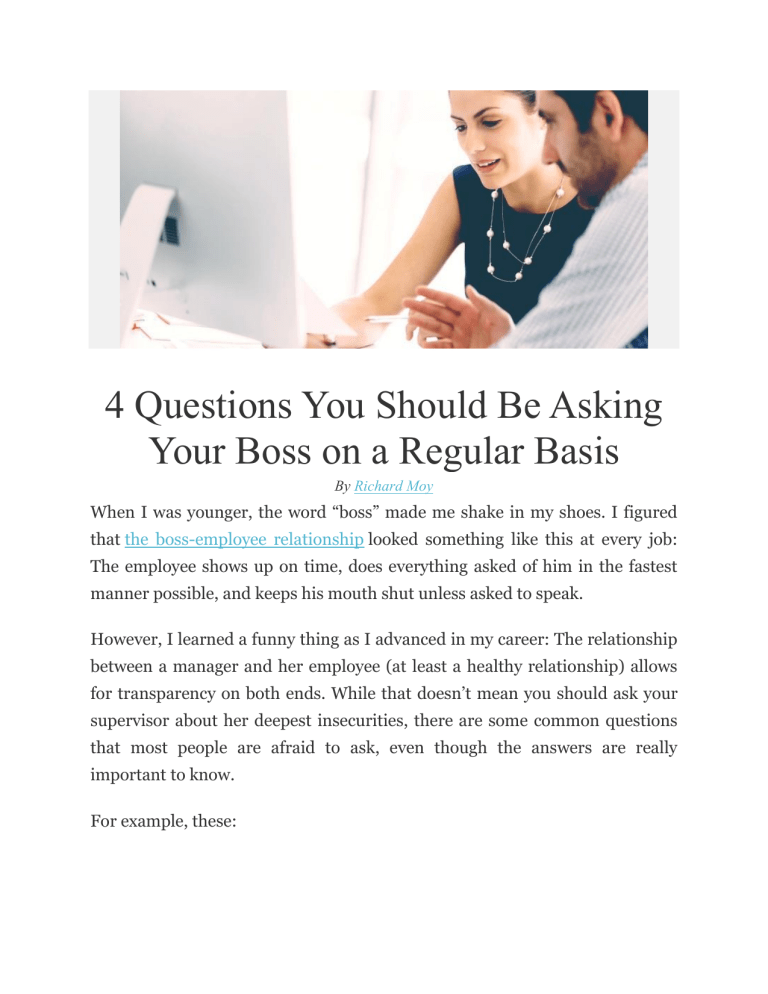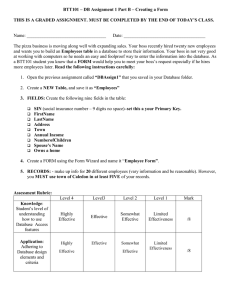4 Questions You Should Be Asking Your Boss on a Regular Basis

4 Questions You Should Be Asking
Your Boss on a Regular Basis
By Richard Moy
When I was younger, the word “boss” made me shake in my shoes. I figured that the boss-employee relationship looked something like this at every job:
The employee shows up on time, does everything asked of him in the fastest manner possible, and keeps his mouth shut unless asked to speak.
However, I learned a funny thing as I advanced in my career: The relationship between a manager and her employee (at least a healthy relationship) allows for transparency on both ends. While that doesn’t mean you should ask your supervisor about her deepest insecurities, there are some common questions that most people are afraid to ask, even though the answers are really important to know.
For example, these:
1. How Are You Doing Today?
Yes, you already might ask this one. But I’m not talking about mumbling it aloud as you walk in at the beginning of the day, with your headphones in, barely paying attention to the answer. But instead, really asking.
This concept seemed ridiculous to me earlier in my career. I just assumed that because my manager was my manager, things were pretty good for her. She was making more money than I was, so that was a start. And I mean, she was a boss , right? Things couldn’t be so bad.
But when I started asking her how she was doing and made it clear I was really asking, I realized that as much as I valued the times when she checked in on my overall state of mind, it was something she appreciated even more when I reciprocated. So don’t be shy about checking in on your boss’ well-being.
Maybe she’ll say “fine,” or maybe she’ll tell she’s really stressed about an upcoming deadline (clueing you into why she might be a little short with you later in the week). Either way, there’s no downside to asking.
2. Am I Doing a Good Job?
There are few feelings worse than the uncertainty of how well (or not) you’re doing at your job, so if you’re ever in doubt, don’t be afraid to ask your boss for her thoughts.
Some companies are better than others about providing constant feedback, even beyond yearly review periods. I’m fortunate to work under someone who will tell me when I’m doing a particularly good job or if something needs to improve. But if that’s not the case for you, there’s no harm in asking for feedback about your overall performance.
Of course, your relationship determines if this is a casual conversation, or a more formal discussion—but either way it’s one that’ll benefit both of you. And unless your manager has a total vendetta against you and wants to sabotage your career (as well as make her life more difficult in the process), odds are that she will be willing to tell you how you’re doing and what areas you can improve in.
3. What Do You Prefer When it Comes to
Communication?
When my work email became easy to access on my phone a few years ago, my world changed. “I can work all the time now,” I thought, “I never have to wonder if I’ve left anything undone!” As ridiculous as that sounds, I just assumed my boss was also working around the clock because it was so easy to do. Turns out that wasn’t the case at all and that she didn’t expect (or want!) to receive my “completed assignment” and “non-urgent” questions on a Saturday afternoon. From her response, I simultaneously learned how my work habits could affect people in a negative way, as well as how to communicate better with my manager.
Along those same lines, posing this question’s also a good way to find out if your supervisor even expects you to check in after hours. I recently responded to something on a Sunday and got an email back from my boss that said, “This could’ve waited until Monday! Go to bed!”
While you should be prepared to hear an answer you’re not thrilled with, you can ask what the expectations are when it comes to back-and-forth email protocol (does he or she want you to respond to every message or just those with a question?), sending long-term project updates (how often does he or
she want a progress report?), and meeting preparation guidelines (should you be speaking up more, less?). The responses will only improve your relationship.
4. How Did You Get to Where You Are Today?
OK, so this might be the type of question you asked when you were interviewing for your current job. If so, that’s great. But even if you’ve scratched the surface, there’s a lot you can learn from your boss’ career story, especially if you’d like to be in a similar position down the road.
And what you’ll learn will probably surprise you. I used to think that anyone who managed people got that status because they never made a career mistake. Ever. But the more I’ve asked people about their paths, the more I’ve realized that all of them overcame a number of obstacles before landing in their current role.
For some, that meant dealing with a longer-than-expected period of unemployment . For others, that meant feeling overwhelmed by their work. In any case, it’s a good way to see how you can advance your career, while also taking solace in the fact that the people above you aren’t perfect, either. And for that very reason, you can ask this question more than once, in a variety of ways. The more you can learn from your manager’s story, the better you’ll be able move forward on your own path.
I know it can be hard to speak up about something you’re curious about, especially when it comes to your boss. And sometimes, you’re going to get
answers you’re not thrilled about. But whether it’s your overall performance you’re wondering about or current project expectations that are unclear, don’t be afraid to ask these questions. I mean, ever. If you sit idly by and just wait for the answers to come to you, you’re not only keeping yourself in the dark about your day-to-day, you’re also preventing yourself from growing into an even more impressive professional. www.themuse.com


